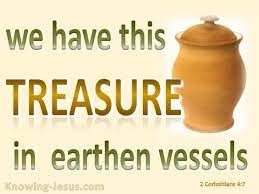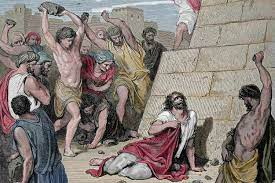Here in Second Corinthians, Chapter 4, we are examining one of the clearest passages in Scripture, in my estimation, to declare the process by which the power of God is released among men. We long, we pray, for that power to be released among us; everyone wants that to happen. I am increasingly concerned, however, about the ignorance of Christians, not only in other places but right here as well, as to their true power. We are surrounded by evidences of decay in society, of increasing corruption, of the disintegration of personality, of increasing hurt and darkness and despair. But all the time I can hear Jesus saying to us, "You are the salt of the earth," (Matthew 5:13 RSV).
Salt is designed to stop corruption, so his word to us is, "You Christians are the salt of the earth. You can stop this kind of thing. If there is moral darkness around, so people do not know the difference between good and evil, so they are blind to what is happening, you are the light of the world, and your light can dispel darkness."
Of course, he says, your salt has to have savor; it has to be salty. You cannot merely put on a front of being salty. You have to be salty, that is, you have to have the divine life and power at work in you, because salt without savor is good for nothing. And light has to be visible, Jesus said. You have to put it up on a hill where it can be seen. Nobody lights a lamp and puts it under a bushel. You cannot live isolated from the world around you. You have got to be right out in the midst of it.
Paul has been describing his ministry in terms of direct combat with what he calls the "god of this age," the invisible being behind this darkness and corruption, the one who has, as he put it in the passage we saw last week, "blinded the minds of the unbelievers," (2 Corinthians 4:4b RSV). But as Paul lives and speaks in light of the fact that Jesus is Lord, then the light begins to break out in the darkness of the world. That is God's process. In Verses 7-11 of Chapter 4 there is a detailed description of how to exercise the power of God; and Verses 12-15 describe how to display the glory of God. That is what life is all about. Christians are Christian in order to exercise the power of God and display the glory of God. That is what Paul is talking about here.
But we have this treasure in earthen vessels, to show that the transcendent power belongs to God and not to us. (2 Corinthians 4:7 RSV)
 First, it is obviously God's deliberate program that his mighty power be displayed through "earthen vessels." That term is not very complimentary. An earthen vessel is nothing but a clay pot, that is all, yet it is a beautifully descriptive term for basic humanity. All of us, in one sense, are nothing but clay pots, although some of you have a little finer clay than others, perhaps. You know, clay can be made into beautiful, fragile chinaware, which, of course, cracks easily. Some of you have cracked already! (They tell me they are developing a science here in California called "psychoceramics." It deals with cracked pots!) Others are more rough and rugged. They are made of adobe mud, baked in the sun (half-baked sometimes, perhaps). But this is our humanity. We are nothing but clay pots.
First, it is obviously God's deliberate program that his mighty power be displayed through "earthen vessels." That term is not very complimentary. An earthen vessel is nothing but a clay pot, that is all, yet it is a beautifully descriptive term for basic humanity. All of us, in one sense, are nothing but clay pots, although some of you have a little finer clay than others, perhaps. You know, clay can be made into beautiful, fragile chinaware, which, of course, cracks easily. Some of you have cracked already! (They tell me they are developing a science here in California called "psychoceramics." It deals with cracked pots!) Others are more rough and rugged. They are made of adobe mud, baked in the sun (half-baked sometimes, perhaps). But this is our humanity. We are nothing but clay pots.
A pot, or a vessel, is made to hold something. This is a beautiful figure to use, because basic to our humanity is that we are not designed to operate on our own. We were made to hold someone; and that someone is God himself. The glory of humanity that we can never get away from is that somehow God designed us to correspond to his deity; and that his marvelous deity, with its fullness and wisdom and power should somehow relate to and correspond to and be manifest through our basic humanity. We are earthen vessels, and that is what Paul is talking about -- clay pots. He is very likely thinking of that Old Testament story of Gideon, who was called of God to deliver Israel from the hands of Midian hosts which had come into the land. Gideon was nothing but an obscure member of one of the more remote tribes of Israel. He had no reputation, he regarded himself as inferior to everyone else, and yet God called him to deliver the nation.
When 32,000 men gathered to help him, God cut the number down to 300. (Some of you remember Ron Ritchie's graphic portrayal of that incident when he preached here recently. I should have Ron here to illustrate it for you.) God told them to take earthen jars, common clay pots, put candles in them, and during the darkness of the night to circle the Midian camp. At the signal of the sound of the trumpets, they were to break the pots so that lights would spring up on every side. When they did that the Midian army was demoralized. They suddenly saw lights springing up all over the mountainside. Thinking they were ringed by an army, they panicked and began to kill each other. That story has great significance for us, because it is really telling us that if we begin to live on the basis of the new covenant, acting and living as though Jesus is Lord, in control of everything in our life and the life of the whole world, we can demoralize the antagonists of Christianity and they will begin to attack one another.
I have seen this happen. Christians have no longer to fight hard, pitched battles, for the battle is often won. That is what Paul is saying here. God's purpose in your life and mine is that we so live that people are actually baffled when they look at us. They say, "I don't get it. I know this person. He (or she) is so ordinary; there is nothing outstanding there, but yet what happens as they go through life is so remarkable that I just don't understand it." They can see that the power is not coming from you; it is coming from God. Paul goes on to describe the way it is going to appear, in Verses 8-9:
We are afflicted in every way, but not crushed; perplexed, but not driven to despair; persecuted, but not forsaken; struck down, but not destroyed; (2 Corinthians 4:8-9 RSV)
I like the graphic way William Barclay translates these verses:
We are sore pressed at every point, but not hemmed in; we are at our wit's end, but never at our hope's end; we are persecuted by men, but never abandoned by God; we are knocked down, but not knocked out. (2 Corinthians 4:8-8 Wm Barclay)
Notice the weakness of the "pot" there, and the transcendence of the power. "Transcendent" means "beyond the ordinary." The power of God is not ordinary. It is different than any other kind of power we know about. Therefore, it is wrong to expect it to be dramatically visible. It is a quiet power that is released in quiet ways, and yet what it accomplished is fabulous. Here is the weakness of the pot: "We are sore pressed; we are at wit's end, we are persecuted, we are knocked down." On the other hand, here is the transcendent power: "We are not hemmed in; we are not at hope's end; we are never abandoned and we are never knocked out." That is the way God expects us to live. The remarkable thing, and the place where we struggle is, it takes both of those. It takes the weakness in order to have the strength. That is what we do not like. We all want to see the power of God in our lives, but we want it to come out of untroubled, peaceful, calm, circumstances. We want to move through life protected from all the dangers and all the difficulties.
Remember how I described it a few weeks ago? We want to be like the Pirates of the Caribbean in Disneyland. We want to go through life in our little boats, gliding through all the difficulties. They appear as though they are going to get us, but they never get close. You come safely out the other end with not a hair of your head mussed, with no real difficulty at all. But that is not what God has in mind. We are to have difficulties and afflictions and persecutions. That is the point. We ought to expect to be "sore pressed," and "at wit's end," and "persecuted," and "knocked down but never knocked out."
I have been interested to notice what has happened to Bob Dylan of late. You know that he has become a Christian and has written some Christian songs. He is now putting on concerts here in this area, and if you have read some of the reviews, you see how angry the world is at him because he is now a Christian. All the old skill is there, the message he conveys is more meaningful than ever, and yet the reviewers are furious at him. He is being persecuted for the name of Jesus; his stand as a Christian is being attacked on every side.
This is what God expects of us. And we are not even permitted to choose the scene of our own martyrdom. We cannot go through this list and choose, "Well, I'll take a few afflictions, but I don't want to be knocked down." We get what God sends. Whatever he wills is what we have to go through. Yet we are never to be knocked out, that is the point.
 Paul is saying that we are not protected from life. I wish we could get over that idea. It is difficult, I know, because the "folk" religion, as Jack Crabtree would call it, that we are constantly exposed to today is telling us something else. It is telling us, "If you're a Christian, God will keep you from all these dangers and troubles. Why, you won't even get sick. If you're really a Christian you'll have no physical illnesses; troubles will evaporate and never come to you."
Paul is saying that we are not protected from life. I wish we could get over that idea. It is difficult, I know, because the "folk" religion, as Jack Crabtree would call it, that we are constantly exposed to today is telling us something else. It is telling us, "If you're a Christian, God will keep you from all these dangers and troubles. Why, you won't even get sick. If you're really a Christian you'll have no physical illnesses; troubles will evaporate and never come to you."
>
This is absolutely wrong. Christians can get cancer, Christians can have financial collapse, Christians can go th
rough difficulties, family separations, divorce, problems of every sort. Sure they can. In spite of all they do, no matter how close to the Lord they walk, they can have these difficulties because out of them God wants to demonstrate a different attitude, a different reaction than other people have. He wants to demonstrate that there is an obvious love and joy and peace about your life that can never be explained in terms of you, but always must be explained only in terms of God at work in you.
Even that is not automatic, because I know many Christians who are afflicted and they are often crushed; they have perplexities that drive them to despair; they are persecuted; they feel abandoned; they are knocked down and often they are knocked out for weeks and years at a time. What makes the difference? Paul's answer is in Verses 10-11. Here we have a marvelous setting out of the process of walking in victory:
...always carrying in the body the death of Jesus, so that the life of Jesus may also be manifested in our bodies. (2 Corinthians 4:10 RSV)
Notice that the "life of Jesus" always rests upon the "death of Jesus." We must have, in our experience, the "death of Jesus" in order to have the "life of Jesus."
For while we live we are always being given up to death for Jesus' sake, so that [in order that] the life of Jesus may he manifested in our mortal flesh. (2 Corinthians 4:11 RSV)
What we want, of course, is the "life of Jesus;" every one of us wants to be like him. But the power of God is the miracle of others seeing in us, in the midst of our pressures and trials, the character and the life of Jesus coming out. I have always been amused and challenged by the verse in Colossians 1, where Paul prays that his friends in Colossae may be "strengthened with all power, according to God's glorious might," (Colossians 1:11). What are they going to use all this power for? It sounds as though Paul ought to say, "So that you can go about doing great miracles; so that you can astonish people with the tremendous magnetism of your preaching and teaching and be followed by great crowds, making a great impact." But that is not what he says at all. He says, "I pray that you may be strengthened with all power, according to his glorious might, unto all endurance and patience with joy," (Colossians 1:11 RSV). That is what takes power; that is where the life and the power of God is manifest. That is the "life of Jesus."
There is a new film out called, Jesus. I have not seen it myself, though I hope to, but everyone I have talked to who has seen it has told me it is a marvelous film. It is very faithful to the record of the Scriptures, and people come away silenced, almost stunned by the picture of Jesus. As you read through the Gospels, the Spirit of God brings to your mind's eye a far more beautiful and wonderful picture, perhaps, of his character and life. You see his compassion of heart, his moral beauty that attracted people everywhere he went. You see the serenity of his spirit, how he moves through every scene of anger and unrest with calmness and quietness. You see his disciplined will and his obvious joy in living. That is the "life of Jesus," and that is what we want, isn't it?
How do you get it? Well, here is the way. The secret, Paul says, is our consent to sharing the dying of Jesus, "always carrying in the body the dying of Jesus, in order that the life of Jesus may be manifested in our mortal flesh." What does he mean by the "dying of Jesus"? You know he does not mean that we have to go out and get ourselves nailed to a cross. But that cross is a symbol of something very real in our experience. What was Jesus like on the cross? He was not powerful, and impressive, and significant; he was not being applauded by the multitudes who listened to his every word. No. The cross was a place of physical weakness, of rejection by the proud and arrogant world around him. It was a place of obscurity, a place where he was willing to lose everything he had built and trust God to bring it back and make it significant. That is what we are talking about.
Are you willing to give up all the things that make you look important to other people, to take the place of obscurity, if necessary, trusting God to use it however he will? That is the "dying of Jesus." Today we are being assaulted on every side by the cult of the human potential. Groups like Est, Transactional Analysis, Transcendental Meditation, and others are saying you need to find some hidden resources in yourself that you can count on. You must develop these resources, and then you will find yourself growing in confidence and ability to handle life. You can be at the top of the heap if you will send in $250 and spend a weekend with them.
People on every side are believing that. And it appears to work. That is the problem. Many of them do find a new source of confidence, a new ability to function, to make a far greater impression on others, but it all comes out at this point: The measure of their success is the degree to which they are recognized by someone else. These blatant cults now proclaim this around us, as do the Christianized versions of them that take the words of Scripture and the songs and hymns of Christians, and glaze them over and present them as a "Christian" way of doing this. But it is still the same old thing, coming out to the glory of the individual, and calling on him to rely upon his own natural resources and abilities to succeed.
But the Christian gospel cuts right across all that. That is the very thing that the "cross" says has to die. We have come to the end of our dependence on ourselves and rest upon the willingness of God to be at work in us, without any flash or demonstration, but in loving, quiet ways to change our whole character until it is like Jesus in the midst of rejection and lack of recognition. Are you willing to do that? If so, you can have the "life of Jesus."
Here is where we struggle, isn't it? We want the power of God, but we want to get credit for it too. If God does anything through us, we want to be sure we get a write up in Christianity Today. If anything happens in our midst, in our home, or in our family, we want it to be known that we spent a lot of hours in prayer over it, that we had counseled so-and-so in such-and-such a helpful way. We want to move in and get the credit every time.
We want the "life of Jesus," but we also want the satisfaction of our own flesh. We want to be serene of spirit and gentle and compassionate of heart, but we also want the joy of telling people off when they are out of line. That is a great pleasure, isn't it? Isn't it amazing how we want to be free from anxiety, to have an untroubled, serene spirit about the future, but at the same time insist on the pleasure of worrying? We enjoy worrying; we feel so much more fulfilled if we have worried awhile, that we have done our share at least. We sometimes say to people, "If I don't worry, who will?" as though somebody has to worry or nothing is accomplished rightly.
That is our problem, isn't it? We want the kingdom of God, and we want our own personal rights as well. But you cannot have both. That is where the new covenant brings us, "always bearing about in the body the dying of Jesus, in order that the life of Jesus may be manifest in our mortal flesh."
That is where Verse 11 helps us, because God takes over. There Paul says, "while we live [not after we die, but while we live] we are always being given up to death for Jesus' sake." Verse 10 is a conscious choice we make where we agree to giving up our personal desire for recognition and significance, etc., in order to let God give it back to us in a right way. But Verse 11 is telling us that there are circumstances into which God puts us where we have to die whether we like it or not.
Have you been in those circumstances recently, where no matter what you do you cannot seem to get any glory or credit for yourself? That is exactly where God wants you, because out of those times of inordinate pressure, times of hurt and despair and heartache, and a sense of being wasted and not used, God is working his will. Others, perhaps, are being given life because of the death you are going through. Paul will speak more about that in just a minute.
I want to tell you that I am going through a time like that right now, and it does not feel good. It does not feel very triumphant or victorious, but that is just the point. We are to be led in triumph by Christ, regardless of how we feel at the moment. It is his work that does it, not ours. That is what Paul is calling us to. Often this transcendent power within us is even recognized by the world. God, in a sense, forces the world at times to pay tribute to this kind of living. That is why Martin Luther, even though he felt abandoned and helpless at the moment, dared to stand against all the secular and sacred power of the day for the truth of God. He finally became the most widely known and recognized man of his age, and has become one of the great names of history. A Mother Teresa can give herself to the slums of Calcutta, and with no longing or hope at all for recognition and honor, suddenly is elected to receive the Nobel Prize. God can give back honor if he wants to, but there must be the willingness to forego it for our own account. Paul looks ahead to see what will happen in the whole church when this begins to happen among us. Verse 12:
So death is at work in us, but life in you. Since we have the same spirit of faith as he had who wrote, "I believed, and so l spoke," we too believe, and so we speak... (2 Corinthians 4:12-13 RSV)
He is quoting here from Psalm 116, where the psalmist is declaring by faith that the trials and the pressures he is going through are going to have some effect and impact in his surroundings. He cannot see it yet, but he says it is going to be true because God has said it. That is where Paul is. He says, "I don't see the life in you yet, but I know it is coming. We are going through the death; we are going through the pressure and the heartache, but it is going to have an impact on you. I know it is coming because that is the kind of God we serve."
...knowing that he who raised the Lord Jesus [that is the Spirit of God] will raise us also with Jesus and bring us with you [see how that ties to Verse 12] into his presence. (2 Corinthians 4:14 RSV)
Paul's confidence grows that this is the nature of the body of Christ. We share life with one another, and as you lose yourself in costly service, life becomes visible in someone else. We all know how this can happen, even in a family. Parents give themselves for years in order that their children might enjoy things. We can do this with one another in the body of Christ. We can endure the loneliness of prayer, and the faithfulness of upholding one another, the difficulty of counseling each other and see life come, as a result, in somebody else. Paul concludes this in Verse 15 with a wonderful picture of where it all comes out:
For it is all for your sake, so that as grace extends to more and more people it may increase thanksgiving, to the glory of God. (2 Corinthians 4:15 RSV)
Notice where it comes out at -- increased thanksgiving. We are being told today that if you take certain praise expressions out of the Bible, "Praise the Lord," "Hallelujah," or "Praise Jesus," and in times of heartache you say those over and over again, you can force God to deliver you from your trial; you manipulate him into it by using praise. That is not what Paul is talking about. He is talking about people who have gone through great sorrow, deep hurt, real heartache, but in the midst of it they have looked to God for strength and have found his comfort. They have known and trusted his love, and the result has been there has been such an inner joy and peace and strengthening in the midst of the trial that they cannot help but give thanks to God that the whole thing came about.
Some years ago I clipped a letter from Billy Graham's Decision magazine that was a wonderful testimony. I do not know whether it comes from a man or a woman because only the initials were of the writer were published:
"For a long time I had been bitter about life. It seemed to have dealt me a dirty blow, for since I was 12 years old I have been waiting for death to close in on me. It was at that time I learned I had muscular dystrophy. I fought hard against this disease and exercised hard, but to no avail. I only grew weaker. All I could see was what I had missed. My friends went away to college, then got married and started having families of their own. When I lay in bed at night thinking, despair would creep from the dark corners to haunt me. Life was meaningless. In March of last year my mother brought home from our public library Billy Graham's book World Aflame. I started reading it, and as I read I realized that I wanted God. I wanted there to be a meaning to life. I wanted to receive this deep faith and peace. All I know is that now my life has changed and I now have joy in living. No longer is the universe chaotic. No longer does life have no goal. No longer is there no hope. There is instead "God who so loved the world that he gave his only Son that whoever believes in him should not perish but have eternal life." I continue to grow weaker. I am close to being totally helpless and am in pain most of the time, but sometimes I am so glad I am alive that it is hard to keep myself from bursting at the seams. I can see for the first time the beauty all around me, and I realize how very lucky I am. Despair is such a waste of time when there is joy; and lack of faith is such a waste of time when there is God."
That is the kind of thanksgiving that glorifies God. Out of the midst of the pain, the pressure, the heartache, and the perplexities there comes a joy, a strength, a faith, and a love that makes clear that the power is not coming from us, but from God. That is what impresses the world. May God help us to live like that. (Ray C. Stedman, Your Pot, His Power, November 4, 1979)
 The Scottish poet laureate Robert Burns, said he was seeking the ability of seeing himself as others saw him.
The Scottish poet laureate Robert Burns, said he was seeking the ability of seeing himself as others saw him. 



 First, it is obviously God's deliberate program that his mighty power be displayed through "earthen vessels." That term is not very complimentary. An earthen vessel is nothing but a clay pot, that is all, yet it is a beautifully descriptive term for basic humanity. All of us, in one sense, are nothing but clay pots, although some of you have a little finer clay than others, perhaps. You know, clay can be made into beautiful, fragile chinaware, which, of course, cracks easily. Some of you have cracked already! (They tell me they are developing a science here in California called "psychoceramics." It deals with cracked pots!) Others are more rough and rugged. They are made of adobe mud, baked in the sun (half-baked sometimes, perhaps). But this is our humanity. We are nothing but clay pots.
First, it is obviously God's deliberate program that his mighty power be displayed through "earthen vessels." That term is not very complimentary. An earthen vessel is nothing but a clay pot, that is all, yet it is a beautifully descriptive term for basic humanity. All of us, in one sense, are nothing but clay pots, although some of you have a little finer clay than others, perhaps. You know, clay can be made into beautiful, fragile chinaware, which, of course, cracks easily. Some of you have cracked already! (They tell me they are developing a science here in California called "psychoceramics." It deals with cracked pots!) Others are more rough and rugged. They are made of adobe mud, baked in the sun (half-baked sometimes, perhaps). But this is our humanity. We are nothing but clay pots. Paul is saying that we are not protected from life. I wish we could get over that idea. It is difficult, I know, because the "folk" religion, as Jack Crabtree would call it, that we are constantly exposed to today is telling us something else. It is telling us, "If you're a Christian, God will keep you from all these dangers and troubles. Why, you won't even get sick. If you're really a Christian you'll have no physical illnesses; troubles will evaporate and never come to you."
Paul is saying that we are not protected from life. I wish we could get over that idea. It is difficult, I know, because the "folk" religion, as Jack Crabtree would call it, that we are constantly exposed to today is telling us something else. It is telling us, "If you're a Christian, God will keep you from all these dangers and troubles. Why, you won't even get sick. If you're really a Christian you'll have no physical illnesses; troubles will evaporate and never come to you."

